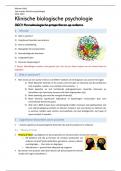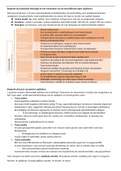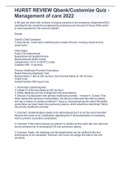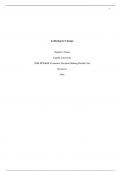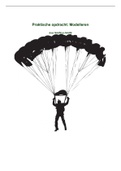1
Hoorcollege aantekeningen Sexology
Table of Contents
Hoorcollege 1: 2 februari 2021...........................................................................................2
Hoorcollege 2: 9 februari 2021...........................................................................................8
Hoorcollege 3: 16 februari 2021.......................................................................................17
Hoorcollege 4: 23 februari 2021.......................................................................................25
Hoorcollege 5: 2 maart 2021............................................................................................33
Hoorcollege 6: 9 maart 2021............................................................................................36
Hoorcollege 7: 16 maart 2021..........................................................................................43
Hoorcollege 8: 23 maart 2021..........................................................................................54
,2
Hoorcollege aantekeningen Sexology
Hoorcollege 1: 2 februari 2021
Definitions
- Sexuality: a central aspect of human being throughout life and encompasses sex, gender
identities and roles, sexual orientation, eroticism, pleasure, intimacy and reproduction
(definition by World Health Organization)
- Sexual rights: basic inalienable rights regarding sexuality both positive and negative so as
right to reproductive self-determination and sexual self-expression and freedom from sexual
abuse and violence
- Sexual health: a state of physical, emotional, mental and social well-being in relation to
sexuality; it is not merely the absence of disease, dysfunction or disability/ the ability to
sexually adapt and self-manage in the face of life’s physical, psychological and social
challenges
- Sexology: the scientific interdisciplinary study of sexuality, looks at all the bio-psycho-social
aspects of sexuality
The meanings/functions of sex
- Procreation
o Fertility
- Relationship
o Bonding of individuals
o Intimacy
o Confirmation of being human/a certain gender
- Recreation
o Pleasure
o Relaxation
o Stress reduction (pain reduction)
o Sleep-induction
o Dealing with emotions
Sex and gender
Bio-psycho-social model of sexuality
- Social aspects: norms and values, religion, culture, relationship, communication
- Biological aspects: oncological illnesses, chronic illness, (chronic) pain, fatigue, bladder
problems, menopause, medication (SSRI), nerves, hormones, infertility
- Psyche aspects: body image, anxiety, depression, self-image, personality
,3
Hoorcollege aantekeningen Sexology
Different theories in the book
- Evolutionary theories: evolution, natural selection (attractiveness), parental investment
- Psychological theories: psycho-analytic, learning theories, social exchange theory and
cognitive theories
- Critical theories: e.g., feminists’ theory, gender as status and inequality, queer theory
- Sociological theories: e.g., sexual scrip theory (religion, economy, law)
Changes in views over time
- Tissot (1766), Onanism, the disorders produced by masturbation
- Heiman & LoPiccolo (1988), Directed masturbation, an effective treatment for lifelong
female orgasmic disorder
- Shows how over time our view on masturbation has changed
Sigmund Freud
- The first to make the transition to a more scientific study of sexuality
- Human behaviour is motivated by:
o Libido
o Thanatos
Libido
- Freud: “the existence of sexual needs in human beings and animals is expressed in biology by
the assumption of a ‘sexual instinct’, on the analogy of the instinct of nutrition, that is of
hunger. Everyday language possesses no counterpart to the word ‘hunger’, but science
makes use of the word ‘libido’ for that purpose.”
- Libido: the subjective experience of a physical need for sex
- According to Freud, the libido is ‘fuelled’ by the sexual instinct, arises from a source within
the body
o A constant force you cannot fight (just like hunger, you have to do something about
it)
- ‘You have sex because your instinct drives you, pushes you’, as a person you need to cope
with the constant instincts
Freud’s stages of psycho-sexual development
1. Pre-genital stages: oral, anal and phallic/oedipal stages (1 – 6 years)
- Coping strategy (for babies): put everything in their mouths
- Phallic/oedipal stage: touching yourself, your genitals a son would want to have sex with
his mother, yet these urges would be suppressed by himself, would give all kinds of negative
feelings of emotions
o Boys: look at the female sexuality
o Girls: develop ‘normal mature female sexuality’
2. Latency stage (6 – 12 years)
- Children aren’t interested in sex in this stage because they haven’t observed it
- Not allowed to talk about sex, so they don’t talk about it
3. Genital stage (12 years onwards)
- Get in touch with the adult way of coping with sexual urges
Mature female sexuality
- Sexual pleasure is transferred from the clitoris to the vagina
- A healthy woman experiences a vaginal orgasm
- If a woman only has a clitoral orgasm, this is a sign of fixation and intrapsychic problems
, 4
Hoorcollege aantekeningen Sexology
Marie Bonaparte
- One of Freud’s patients
- Was unable to achieve a vaginal orgasm, despite many years of analysis with Freud
- She did research on the distance between clitoris and urethra
o N = 200
o Variations from 1.25cm to 3.5cm
o Paraclitoridian < 2.5cm
o Mesoclitoridian = 2.5cm
o Teleclitoridian > 2.5cm
- They ended up relocating her clitoris so the distance would be different (could result in
orgasms)
Early 1900s
- Havelock Ellis: medical and anthropological findings
o Liberal view on female sexuality and deviations (“it’s not that strange, because it
varies between women”)
- Kraftt-Ebing: classification of perversions/deviations (“psychopathia sexualis”)
o We still use some of his terms (e.g., sadism)
- Bloch: methods and insights of “sexualwissenschaft” (sexology) must correspond with
insights of natural and cultural sciences
- Magnus Hirschfeld: had an institute for sexology, did research on sexuality prevention, very
important in the emancipation of people with a different gender/sexual orientation (in the
LGBT community, in that time it was very revolutionary)
Themes in the first 30 years of the 20th century
- Clinical methodology based on case studies
- Need for scientific research
- Belief in a universal sexual instinct (libido)
- Divergences were thought the be the result of disease, and should be treated by a physician
After WW2: leading role for the US
- Alfred Kinsey, biologist
- Founder of institute for sex research (19745)
- ‘course’ on marriage (for students who were married or expecting marriage) surprised
because sexuality was neglected/not discussed in the course
- Interviewed 11.000 Americans about their sexual behaviour/lives
John Money (1921 – 2006)
- Psychologist
- Study of the development of gender identity in children
- A strong environmental influence in the way children is raised with their feelings of being
male/female
o How parents behave and interact with you as a child result in the child showing
more/less female/male behaviours
o Nurture > narture, in the development of the gender identity
Nature-nurture controversy
- Twins (boys) were ‘circumcised’
- One of the two operations went wrong
Hoorcollege aantekeningen Sexology
Table of Contents
Hoorcollege 1: 2 februari 2021...........................................................................................2
Hoorcollege 2: 9 februari 2021...........................................................................................8
Hoorcollege 3: 16 februari 2021.......................................................................................17
Hoorcollege 4: 23 februari 2021.......................................................................................25
Hoorcollege 5: 2 maart 2021............................................................................................33
Hoorcollege 6: 9 maart 2021............................................................................................36
Hoorcollege 7: 16 maart 2021..........................................................................................43
Hoorcollege 8: 23 maart 2021..........................................................................................54
,2
Hoorcollege aantekeningen Sexology
Hoorcollege 1: 2 februari 2021
Definitions
- Sexuality: a central aspect of human being throughout life and encompasses sex, gender
identities and roles, sexual orientation, eroticism, pleasure, intimacy and reproduction
(definition by World Health Organization)
- Sexual rights: basic inalienable rights regarding sexuality both positive and negative so as
right to reproductive self-determination and sexual self-expression and freedom from sexual
abuse and violence
- Sexual health: a state of physical, emotional, mental and social well-being in relation to
sexuality; it is not merely the absence of disease, dysfunction or disability/ the ability to
sexually adapt and self-manage in the face of life’s physical, psychological and social
challenges
- Sexology: the scientific interdisciplinary study of sexuality, looks at all the bio-psycho-social
aspects of sexuality
The meanings/functions of sex
- Procreation
o Fertility
- Relationship
o Bonding of individuals
o Intimacy
o Confirmation of being human/a certain gender
- Recreation
o Pleasure
o Relaxation
o Stress reduction (pain reduction)
o Sleep-induction
o Dealing with emotions
Sex and gender
Bio-psycho-social model of sexuality
- Social aspects: norms and values, religion, culture, relationship, communication
- Biological aspects: oncological illnesses, chronic illness, (chronic) pain, fatigue, bladder
problems, menopause, medication (SSRI), nerves, hormones, infertility
- Psyche aspects: body image, anxiety, depression, self-image, personality
,3
Hoorcollege aantekeningen Sexology
Different theories in the book
- Evolutionary theories: evolution, natural selection (attractiveness), parental investment
- Psychological theories: psycho-analytic, learning theories, social exchange theory and
cognitive theories
- Critical theories: e.g., feminists’ theory, gender as status and inequality, queer theory
- Sociological theories: e.g., sexual scrip theory (religion, economy, law)
Changes in views over time
- Tissot (1766), Onanism, the disorders produced by masturbation
- Heiman & LoPiccolo (1988), Directed masturbation, an effective treatment for lifelong
female orgasmic disorder
- Shows how over time our view on masturbation has changed
Sigmund Freud
- The first to make the transition to a more scientific study of sexuality
- Human behaviour is motivated by:
o Libido
o Thanatos
Libido
- Freud: “the existence of sexual needs in human beings and animals is expressed in biology by
the assumption of a ‘sexual instinct’, on the analogy of the instinct of nutrition, that is of
hunger. Everyday language possesses no counterpart to the word ‘hunger’, but science
makes use of the word ‘libido’ for that purpose.”
- Libido: the subjective experience of a physical need for sex
- According to Freud, the libido is ‘fuelled’ by the sexual instinct, arises from a source within
the body
o A constant force you cannot fight (just like hunger, you have to do something about
it)
- ‘You have sex because your instinct drives you, pushes you’, as a person you need to cope
with the constant instincts
Freud’s stages of psycho-sexual development
1. Pre-genital stages: oral, anal and phallic/oedipal stages (1 – 6 years)
- Coping strategy (for babies): put everything in their mouths
- Phallic/oedipal stage: touching yourself, your genitals a son would want to have sex with
his mother, yet these urges would be suppressed by himself, would give all kinds of negative
feelings of emotions
o Boys: look at the female sexuality
o Girls: develop ‘normal mature female sexuality’
2. Latency stage (6 – 12 years)
- Children aren’t interested in sex in this stage because they haven’t observed it
- Not allowed to talk about sex, so they don’t talk about it
3. Genital stage (12 years onwards)
- Get in touch with the adult way of coping with sexual urges
Mature female sexuality
- Sexual pleasure is transferred from the clitoris to the vagina
- A healthy woman experiences a vaginal orgasm
- If a woman only has a clitoral orgasm, this is a sign of fixation and intrapsychic problems
, 4
Hoorcollege aantekeningen Sexology
Marie Bonaparte
- One of Freud’s patients
- Was unable to achieve a vaginal orgasm, despite many years of analysis with Freud
- She did research on the distance between clitoris and urethra
o N = 200
o Variations from 1.25cm to 3.5cm
o Paraclitoridian < 2.5cm
o Mesoclitoridian = 2.5cm
o Teleclitoridian > 2.5cm
- They ended up relocating her clitoris so the distance would be different (could result in
orgasms)
Early 1900s
- Havelock Ellis: medical and anthropological findings
o Liberal view on female sexuality and deviations (“it’s not that strange, because it
varies between women”)
- Kraftt-Ebing: classification of perversions/deviations (“psychopathia sexualis”)
o We still use some of his terms (e.g., sadism)
- Bloch: methods and insights of “sexualwissenschaft” (sexology) must correspond with
insights of natural and cultural sciences
- Magnus Hirschfeld: had an institute for sexology, did research on sexuality prevention, very
important in the emancipation of people with a different gender/sexual orientation (in the
LGBT community, in that time it was very revolutionary)
Themes in the first 30 years of the 20th century
- Clinical methodology based on case studies
- Need for scientific research
- Belief in a universal sexual instinct (libido)
- Divergences were thought the be the result of disease, and should be treated by a physician
After WW2: leading role for the US
- Alfred Kinsey, biologist
- Founder of institute for sex research (19745)
- ‘course’ on marriage (for students who were married or expecting marriage) surprised
because sexuality was neglected/not discussed in the course
- Interviewed 11.000 Americans about their sexual behaviour/lives
John Money (1921 – 2006)
- Psychologist
- Study of the development of gender identity in children
- A strong environmental influence in the way children is raised with their feelings of being
male/female
o How parents behave and interact with you as a child result in the child showing
more/less female/male behaviours
o Nurture > narture, in the development of the gender identity
Nature-nurture controversy
- Twins (boys) were ‘circumcised’
- One of the two operations went wrong



